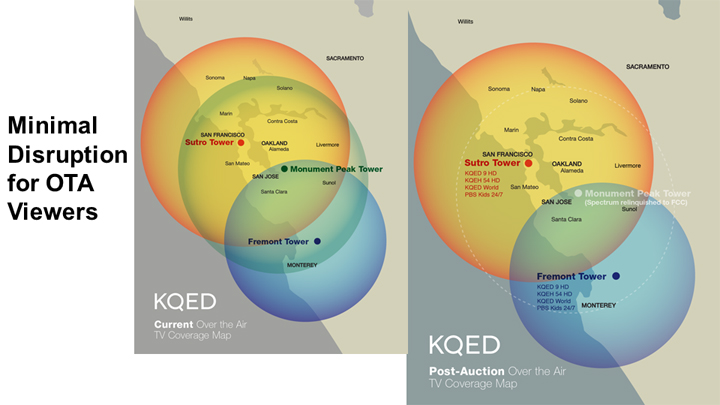San Francisco, CA — KQED, the public media organization serving the San Francisco Bay Area, will receive a one-time sum of $95.4 million for relinquishing back to the Federal Communications Commission (FCC) six megahertz of broadcast spectrum as part of the recently concluded incentive auction. The FCC seeks to repurpose underutilized television broadcast spectrum to satisfy the growing demand for wireless services, and KQED was able to participate without a significant impact on either services or coverage for Bay Area residents. The KQED Board of Directors has determined that the auction proceeds will be invested in KQED’s long-term sustainability and none of the funds will be utilized for ongoing operating expenses.
KQED is in the unusual position of holding three FCC television broadcast licenses comprising 18 megahertz of overlapping spectrum in the Bay Area, broadcasting from towers in San Francisco, San Jose and Salinas. This extensive coverage made sense earlier in the 20th century when television used analog technology and most viewers received the signal over the air. Today, the vast majority of Bay Area residents receive their television via cable or satellite services, and digital broadcast technology now supports multiple channels of programming from each tower. Therefore, KQED will be able to relinquish six megahertz of spectrum, currently broadcasting from the San Jose tower, and maintain full service to the region, including the recent addition of the 24/7 PBS KIDS channel and the upgrade to high-definition (HD) broadcast on KQED Plus (KQEH).
The auction will have no impact on residents who receive their television via cable, satellite or the Internet, which accounts for approximately 90 percent of Bay Area households. Those viewers who utilize an antenna to receive KQED over the air, and who currently receive the signal from the San Jose tower, will need to redirect their antenna to either San Francisco or Salinas, both of which will be broadcasting the full suite of KQED channels, including KQED Plus. Of the more than 1 million TV households in the region, KQED estimates that less than 1,000 might have reception issues after the change, and the station will work directly with those viewers to mitigate any problems.

“The KQED Board carefully evaluated the opportunity presented by the auction and we retained outside financial and technical counsel to advise us. After many months of deliberation, the Board decided this was a unique opportunity coming at a pivotal time in KQED’s history,” said Board Chair Chuck Kissner. “KQED is in the midst of a significant transformation to serve the dramatically changing needs of the people of the Bay Area. The auction proceeds will be reserved for permanent assets related to our transformation and invested in our endowment for KQED’s long-term sustainability.”
KQED’s Board of Directors is made up of 29 community volunteers who oversee the organization, one of the largest in public media, serving nearly 3 million people each week with radio, television, mobile, social, online and classroom services and an annual budget of more than $70 million. The Board, in approving FCC auction participation, emphasized the importance of dedicating any auction proceeds to the long-term good of KQED and the community in return for relinquishing spectrum.